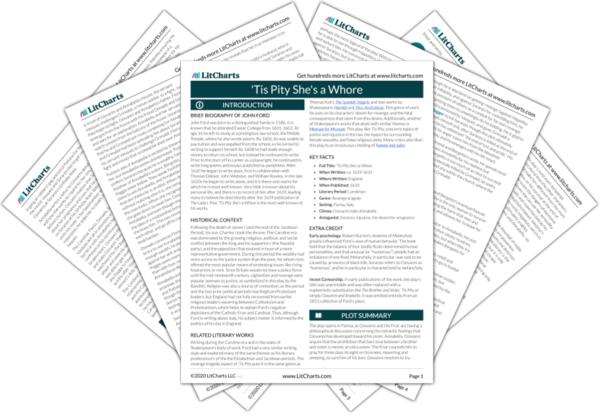Throughout the play, swords and daggers are used by various characters to win vengeance, particularly by the men (the only woman who tries to seek vengeance, Hippolita, uses poison instead). Because swords were often used in this literary period as a euphemism for the penis, swords and daggers become linked to manhood and masculine desire, and therefore also create a symbolic link between desire and violence.
Indeed, this method of killing only appears in the play as a consequence of lust. First, Grimaldi goes after Soranzo with a dagger because he is jealous that Soranzo has won Annabella. Soranzo threatens Annabella with a sword because she has been unfaithful to him. At the end of the play, Giovanni kills Annabella with a dagger, having killed her in fulfillment of their earlier vow to love each other or kill each other. Lastly, Giovanni stabs Soranzo because he tortured Annabella, and Vasquez stabs Giovanni in return because he committed incest and cuckolded Soranzo. Thus, swords and daggers inextricably tie lust and bloodlust together in a symbolically male package, and remind readers that carnal desires—for vengeance or sex—ultimately lead to destruction.
Swords and daggers Quotes in 'Tis Pity She's a Whore
On my knees,
Brother, even by our mother’s dust I charge you,
Do not betray me to your mirth or hate:
Love me, or kill me, brother.
There stands these wretched things,
Who have dreamt out whole years in lawless sheets
And secret incests, cursing one another.
Then you will wish each kiss your brother gave
Had been a dagger’s point.
Now guide my hand, some angry Justice,
Home to his bosom.
ANNABELLA: What means this?
GIOVANNI: To save thy fame, and kill thee in a kiss.
Stabs her [as they kiss].
Thus die, and die by me, and by my hand.
Revenge is mine, honour doth love command.












